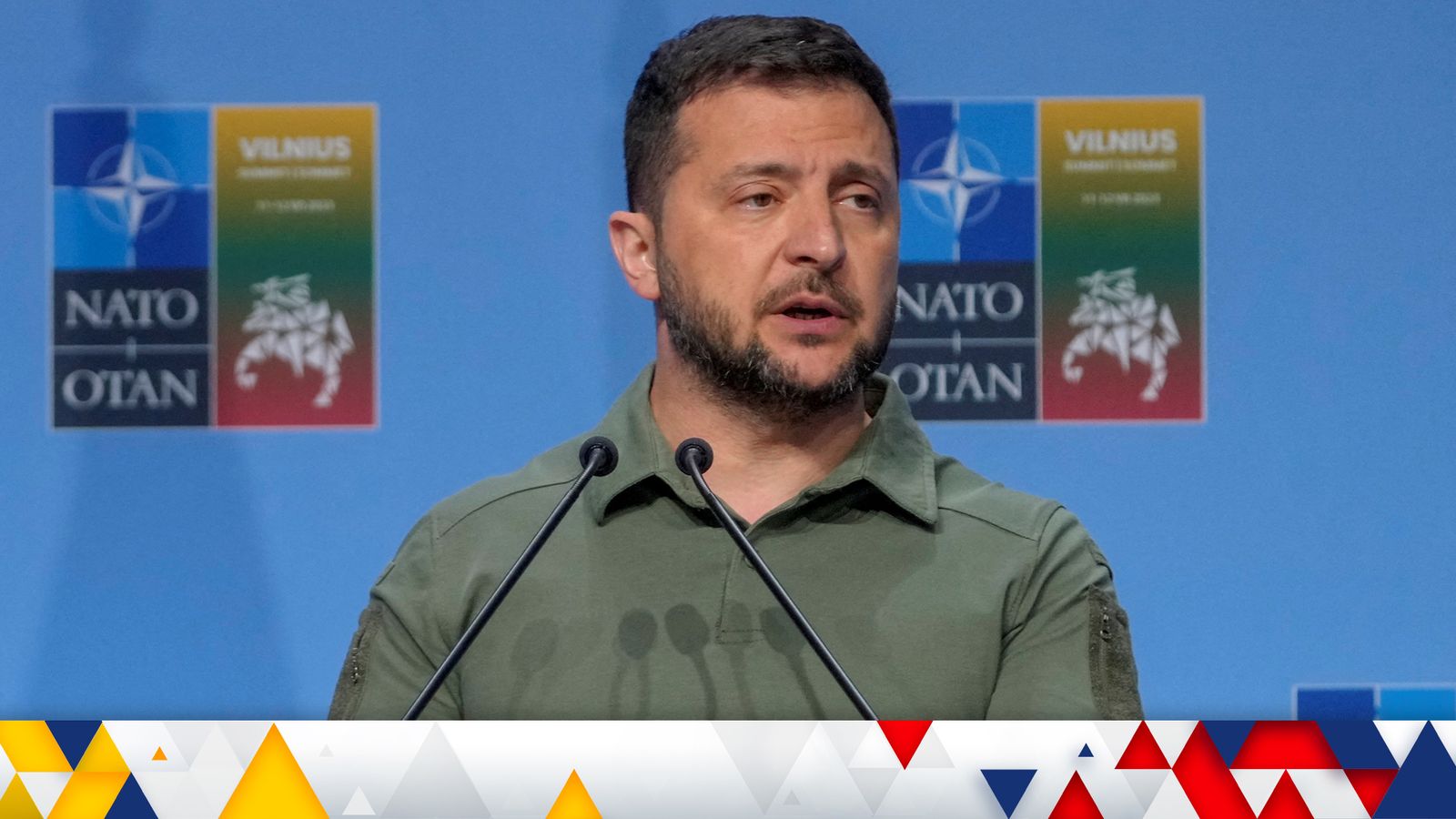A rift has emerged at the NATO summit in Lithuania as the military alliance struggles to find a consensus on Ukraine’s future membership.
A new forum, named the NATO–Ukraine Council, will be established as one of several commitments set to be signed by G7 countries and other allies today after they promised to provide Ukraine with more military assistance for fighting Russia.
But the move is seen as part of NATO’s effort to bring Ukraine as close as possible to the alliance without actually joining it.
Ukraine latest: Kremlin reacts to NATO summit
On Tuesday, leaders said that Ukraine can join “when allies agree and conditions are met”.
Be the first to get Breaking News
Install the Sky News app for free
US President Joe Biden and other leaders will meet with Ukraine President Volodymyr Zelenskyy in the first meeting of the permanent council where the war-torn country will be able to call crisis talks and sit as equals.
Western countries are willing to keep sending weapons outside the alliance to help Ukraine, without the country joining its ranks.
Volodymyr Zelenskyy criticises ‘absurd’ lack of timetable for Ukraine to join NATO as he arrives at summit in Vilnius
Ukraine has ‘window of opportunity’ this year to take back territory from Russia before ‘war fatigue’, says Czech Republic’s president
Turkish president backs Sweden’s entry to NATO, head of military alliance says
But there has been significant disagreement between the 31 countries in NATO, with Mr Biden saying he doesn’t think Ukraine is ready to join the alliance.
“We have to stay outside of this war but be able to support Ukraine. We managed that very delicate balancing act for the last 17 months,” Belgian Prime Minister Alexander De Croo said.
“It’s to the benefit of everyone that we maintain that balancing act.”
But Latvian Prime Minister Krisjanis Karins, whose country lies on NATO’s eastern flank and has a long, troubled history with Russia, said he wanted more commitments for Ukraine.
“There will always be a difference of flavour of how fast you would want to go,” he said.
“But at the end of it, what everyone gets, including Ukraine, and what Moscow sees is we are all very united.”
Prime Minister Rishi Sunak said in a statement that supporting Ukraine’s “progress on the pathway to NATO membership, coupled with formal, multilateral, and bilateral agreements and the overwhelming support of NATO members will send a strong signal to President Putin and return peace to Europe”.
Mr Zelenskyy is attending the summit’s final day in Vilnius but he has been sharply critical of what he described as NATO’s “absurd” reluctance to set a timeline for his country’s acceptance into the alliance.
The Ukrainian president said in a speech on Tuesday that he had faith in NATO, but that he would “like this faith to become confidence, confidence in the decisions that we deserve, all of us, every soldier, every citizen, every mother, every child”.
“Is that too much to ask?” he added.
A major problem for NATO is defining the end of the Ukraine war, at which point the country could join.
NATO officials have declined to identify at what stage this could happen, suggesting it could range from a negotiated ceasefire or Ukraine reclaiming all occupied territory.
This issue essentially gives Mr Putin veto power over Ukraine’s NATO membership by continuing the conflict.
Read more:
Ukraine has ‘window of opportunity’ to take back territory from Russia before ‘war fatigue’, says Czech Republic’s president
Volodymyr Zelenskyy criticises ‘absurd’ lack of timetable for Ukraine to join NATO
Turkish president backs Sweden’s entry to NATO
Under Article 5 of the NATO charter, members are obligated to defend each other from attack, which could swiftly draw the US and other nations into direct fighting with Russia if Ukraine joins the alliance.
Meanwhile, Mr Zelenskyy and Mr Sunak held a bilateral meeting in Vilnius this morning.
“The meeting with Prime Minister of the United Kingdom Rishi Sunak has begun,” Mr Zelenskyy posted on Twitter.
“Our negotiations always enhance global security! More news to come.”






